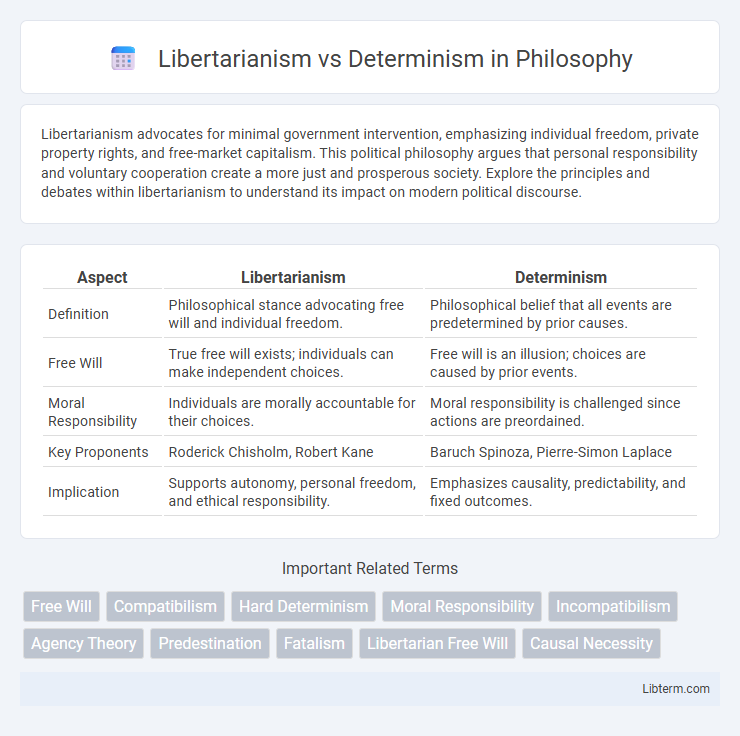Libertarianism advocates for minimal government intervention, emphasizing individual freedom, private property rights, and free-market capitalism. This political philosophy argues that personal responsibility and voluntary cooperation create a more just and prosperous society. Explore the principles and debates within libertarianism to understand its impact on modern political discourse.
Table of Comparison
| Aspect | Libertarianism | Determinism |
|---|---|---|
| Definition | Philosophical stance advocating free will and individual freedom. | Philosophical belief that all events are predetermined by prior causes. |
| Free Will | True free will exists; individuals can make independent choices. | Free will is an illusion; choices are caused by prior events. |
| Moral Responsibility | Individuals are morally accountable for their choices. | Moral responsibility is challenged since actions are preordained. |
| Key Proponents | Roderick Chisholm, Robert Kane | Baruch Spinoza, Pierre-Simon Laplace |
| Implication | Supports autonomy, personal freedom, and ethical responsibility. | Emphasizes causality, predictability, and fixed outcomes. |
Introduction to Libertarianism and Determinism
Libertarianism emphasizes free will, asserting individuals have genuine control over their choices independent of causal determinism. Determinism posits that every event or decision is the inevitable result of preceding causes and natural laws, negating true freedom in human actions. The philosophical debate centers on whether human behavior is autonomously self-directed or predetermined by external factors.
Defining Free Will: Libertarianism Explained
Libertarianism defines free will as the ability of agents to make genuinely undetermined choices, emphasizing personal responsibility and moral accountability. It asserts that human decisions are not predetermined by causal chains or prior events, allowing true autonomy in action. This perspective contrasts sharply with determinism, which views all events, including human decisions, as the inevitable result of preceding causes.
Understanding Determinism: The Core Concepts
Determinism asserts that every event or state of affairs, including human decisions, is the inevitable result of preceding causes governed by natural laws. This concept challenges the notion of free will by suggesting that choices are predetermined by prior conditions, making human actions predictable in principle. Understanding deterministic frameworks requires analyzing causal chains and the influence of external factors on behavior, which contrast sharply with libertarian views emphasizing autonomous decision-making.
Historical Evolution of the Debate
Libertarianism and determinism have been central to philosophical debates since antiquity, with early contributions from Aristotle promoting free will versus Stoic determinism. During the Enlightenment, thinkers like Immanuel Kant revived the discussion by arguing for moral responsibility despite causal determinism. The 20th century introduced analytical perspectives through philosophers such as A.J. Ayer and Daniel Dennett, shaping modern discourse on the compatibility of free will and determinism.
Key Philosophical Arguments for Libertarianism
Libertarianism in philosophy asserts that individuals possess free will that is incompatible with determinism, emphasizing the capacity for genuine choice and moral responsibility. Key arguments include the notion that individuals are the true originators of their actions, which cannot be wholly predicted or predetermined by prior states of the universe. Advocates also highlight the uncertainty and indeterminacy observed in human decision-making, supporting the existence of autonomous agency beyond deterministic causality.
Major Critiques and Challenges to Determinism
Determinism faces major critiques centered on its apparent denial of free will and moral responsibility, as it implies that every event, including human actions, is causally determined by prior states. Critics argue that this undermines individual agency and ethical accountability, posing challenges to legal and social systems based on personal choice. The challenge also includes reconciling determinism with emerging insights from quantum mechanics, which suggest indeterminacy at fundamental levels, complicating deterministic frameworks.
Compatibilism: Bridging Libertarianism and Determinism
Compatibilism reconciles Libertarianism's emphasis on free will with Determinism's causal laws by redefining freedom as acting according to one's motivations without external coercion. This philosophical approach asserts that determinism is compatible with moral responsibility, suggesting individuals make meaningful choices within deterministic frameworks. Key thinkers like Daniel Dennett and Harry Frankfurt argue compatibilism preserves autonomy while acknowledging causal influences.
Implications for Ethics and Moral Responsibility
Libertarianism asserts that individuals possess free will, enabling genuine moral responsibility and ethical accountability for their actions. Determinism posits that all events, including human behavior, are causally determined by prior states, challenging traditional notions of moral responsibility by suggesting actions are inevitable. The debate influences ethical frameworks by questioning whether praise and blame are justifiable, impacting legal systems and social norms regarding individual autonomy and culpability.
Contemporary Perspectives and Debates
Contemporary perspectives on libertarianism versus determinism center on the debate over free will's compatibility with scientific findings in physics and neuroscience. Modern libertarians uphold the existence of genuine choice, emphasizing moral responsibility and conscious agency, while determinists argue that all events, including human actions, are causally determined by prior states of the universe. Recent discussions incorporate advancements in quantum mechanics and cognitive science to reassess how indeterminism or neural mechanisms influence human freedom and accountability.
Conclusion: Navigating Libertarianism and Determinism
Navigating Libertarianism and Determinism involves understanding that Libertarianism upholds free will as an inherent human capacity, allowing for moral responsibility and personal autonomy. Determinism asserts that all events, including human actions, are causally determined by preceding events or natural laws, challenging the concept of free will. Reconciling these perspectives requires exploring compatibilist approaches that integrate deterministic frameworks with meaningful notions of choice and accountability.
Libertarianism Infographic

 libterm.com
libterm.com